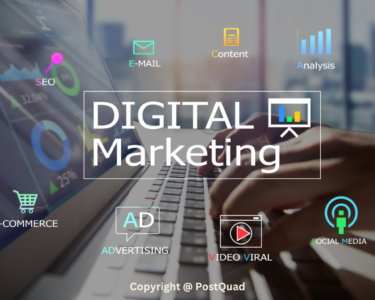 The online world is constantly evolving, so it’s essential to stay up-to-date with the key principles of digital marketing to stay ahead of the game.
The online world is constantly evolving, so it’s essential to stay up-to-date with the key principles of digital marketing to stay ahead of the game.
But, what are the principles of digital marketing? Our digital marketing experts have rounded up the core principles you would like to know to achieve online success. You’ll factor these expert tips into your broader digital marketing strategy or across your various digital marketing channels.
What is Digital Marketing?
This is the 21st-century area of marketing. The 20th century was centered around TV, radio, and out-of-home advertising. Digital channels like search engines, social media, email, and other websites have been appropriated, proving to be the foremost effective way of connecting brands with their potential customers. Digital marketing is significant for raising your business’s brand awareness and generating sales. Most brands have an internet site, and if they don’t, they have a minimum of having a social media presence or a digital advertising strategy in place. Digital Content and marketing are so typical that buyers now expect and rely on them to make purchasing decisions. To be competitive, you would like to embrace digital marketing.
What are the kinds of Digital Marketing?
As we mentioned, digital marketing is consistently evolving. We’ve listed the most methods below with a brief explanation:
Search Engine Optimization (SEO)
This is the large one. It optimizes your website to “rank” higher in search engines.
Content Marketing
Creating and promoting content to build your brand and connect with clients.
Social Media Marketing
Promotes your brand and content on social media channels to extend traffic and growth.
Pay Per Click (PPC)
Driving traffic to your website by paying a publisher whenever your advert is clicked.
Affiliate Marketing
Presentation-based advertising is where you offer a commission to other websites or influencers for mention sales for you.
Marketing Automation
Software that supplies to automate your vital marketing.
Email Marketing
How of communicating with audiences, often wont to promote content, discounts, and events.
Online PR
Like traditional PR, but online to urge coverage with digital publications, websites, etc.
Inbound Marketing
A marketing mode where you engage, attract, and delight customers at each stage of their ride.
Sponsored content
You pay a 3rd party to create and promote content discussing your brand or service.
So, we’ve covered most types, but what are key digital Principles of Digital Marketing?
Content Marketing
There are endless amounts of content on the web, so it shouldn’t be a surprise that not all of it’ll be of high value. A strategic content marketing strategy sets you aside from competitors by creating authentic, engaging, and shareable content. Your content must be of the best quality, from high-resolution imagery and original messaging to navigation and page design. You would like to give customers what they want, so it’s easy for them to know your offering and choose to purchase from you over your competitors. Content is every single thing to your current and possible clients, and it’s why they interchange with you. Your content also must be relevant, consistent, and timely. If your content is meaningless, it’ll dilute and damage your brand. As a result, your relationship together with your customers will suffer.
Understand Your Customer
By this, we mean you ought to do your research. Knowing your customer will help your content marketing, email, and social media marketing tactics. This principle may sound basic, but it can become lost when chasing the subsequent ‘big idea .’Plus, basic and straightforward messages are the best. You’ve got to capture your customer’s attention by speaking directly, clearly, and easily to them. You target your specific audience; otherwise, you’ll miss your mark and market.
You can use many tools to research your audience, like Google Analytics, to know your demographics and audience. Other research may include engaging them with qualitative and quantitative research, especially if you’re a large company or seeking to overhaul a service through user experience.
Test, Measure & Optimize
Monitoring, testing, and measuring your analytics is significant for optimizing your digital marketing strategy.
No other sort of marketing can compete with digital when gaining valuable consumer data. Whether it’s the total number of search queries on Google about your brand or the number of repeat visitors and traffic on your website, this data enables you to make informed decisions and make positive progress.
When testing digital marketing methods, set clear targets of what you would like to achieve. For instance, you’ll aim to send several email engagements per month or generate conversions through a promotion or via your blog. Every goal you set as a part of a marketing plan should be measurable. You’ll not want to set absolute goals but have a figure in mind to track and build on each month.
Keep it Simple
We touched thereon earlier, but there’s no better principle than keeping things simple and easy to understand when it comes to marketing. Digital marketing campaigns and initiatives often miss the mark because they’re overcomplicated. So keep your message to the purpose. Users’ attention spans when scrolling online became short! Short and uncomplicated content is the most essential for engagement; this is not just mentioned in messages. Your website should be quick and straightforward to navigate as part of user experience basics too.
Keep it simple when trying new marketing tactics or optimizing your tried-and-tested modes. That way, if they are doing fail, it’s not catastrophic. Instead, examine everything you do with your marketing as a test. You’ll tweak strategies and methods until they work and keep developing. The digital world is overcrowded, so be succinct to attach with your customers.
Don’t Stand Still
The digital world all the time changes with new trends, platforms, and technologies emerging usually. So, your digital marketing must grow, too. You need to commit all the time to aim to improve and expand. Try recommend it on social media and thru emails. Put supply, like money and time, aside for research. A part of your research should involve looking into what your competition is doing well and not so well, so you recognize where you should focus your marketing efforts.
If you don’t want to be hopping on the subsequent big bandwagon and falling behind competitors, you’ll have to put the time and effort into forecasting trends or creating your own. This is often not just limited to you. It also includes your customers. For instance, you would like to adapt to their changing needs or based on their feedback through sales or web traffic.
Benchmark your Marketing Effectiveness
Using a handy tool such as our Marketing Effectiveness Scorecard will help you recognize your strengths and weaknesses across your branding, customer personas, engagement, and conversion strategies.
Once completed, we’ll email you a free and personalized report filled with recommendations on where and how to improve your e-commerce marketing strategy.
If you like this post then you might also like this:





